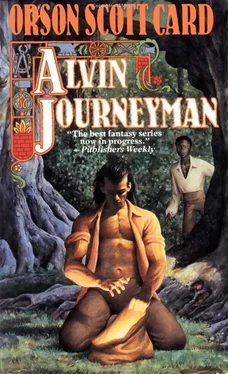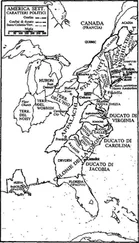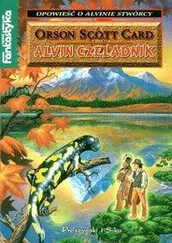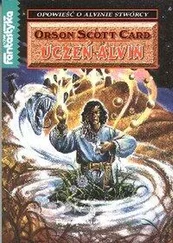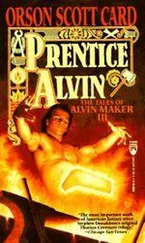Orson Card - ALVIN JOURNEYMAN
Здесь есть возможность читать онлайн «Orson Card - ALVIN JOURNEYMAN» весь текст электронной книги совершенно бесплатно (целиком полную версию без сокращений). В некоторых случаях можно слушать аудио, скачать через торрент в формате fb2 и присутствует краткое содержание. Жанр: Фантастика и фэнтези, на английском языке. Описание произведения, (предисловие) а так же отзывы посетителей доступны на портале библиотеки ЛибКат.
- Название:ALVIN JOURNEYMAN
- Автор:
- Жанр:
- Год:неизвестен
- ISBN:нет данных
- Рейтинг книги:3 / 5. Голосов: 1
-
Избранное:Добавить в избранное
- Отзывы:
-
Ваша оценка:
- 60
- 1
- 2
- 3
- 4
- 5
ALVIN JOURNEYMAN: краткое содержание, описание и аннотация
Предлагаем к чтению аннотацию, описание, краткое содержание или предисловие (зависит от того, что написал сам автор книги «ALVIN JOURNEYMAN»). Если вы не нашли необходимую информацию о книге — напишите в комментариях, мы постараемся отыскать её.
ALVIN JOURNEYMAN — читать онлайн бесплатно полную книгу (весь текст) целиком
Ниже представлен текст книги, разбитый по страницам. Система сохранения места последней прочитанной страницы, позволяет с удобством читать онлайн бесплатно книгу «ALVIN JOURNEYMAN», без необходимости каждый раз заново искать на чём Вы остановились. Поставьте закладку, и сможете в любой момент перейти на страницу, на которой закончили чтение.
Интервал:
Закладка:
It was ten-thirty in the morning before the Finders, seated at a single long table before the judge's bench, were satisfied that they had got the information they needed from the cachet belonging to a certain Cavil Planter of Oily Spring, Kenituck. The judge had the deposition, carefully taken by Mr. Webster at Mr. Planter's home in Carthage City, Wobbish. Planter had attempted to assert that the cachet was a collection of nail and hair clippings and a bit of dried skin taken from one Arthur Stuart of Hatrack River; but Webster insisted that he state the exact legal situation, which was that the items in the cachet were taken from an unnamed baby born on his farm in Appalachee to a slave woman belonging to Mr. Planter at the time, who had shortly afterward escaped—with, as Planter insisted on adding, the help of the devil, who gave her the power to fly, or so it was rumored among the ignorant and superstitious slaves.
The Finders were ready; the boys were led in, one at a time, and lined up in a row in front of them. All the boys were dressed in ordinary clothing, and all were more or less of a size. Their hands were covered, not with gloves, but with burlap bags tied above their elbows; a finer sacking material also covered their heads with loose-fitting hoods. No scrap of skin was visible; care had even been taken to make sure there was no gap between the buttons of their shirts. And just in case, a large placard with a number on it hung from each boy's neck, completely covering his shirtfront.
Verily watched carefully. Was there some difference between the Black sons of Mock Berry and the White boys? Something about their walk, their stance? Indeed, there were differences among the boys—this one's pose of insouciance, that one's nervous fidgeting—but Verily could not tell which were White and which were Black. Certainly he could not tell which one was Arthur Stuart, the boy who was not fully of either race. This did not mean, however, that the Finders did not know or could not guess.
Alvin assured him, though, that their knack would be useless to them, since Arthur Stuart was no longer a fair match for the cachet.
And Alvin was right. The Finders looked puzzled when the last boy was brought in and the judge said, "Well, which of them matches the cachet?" Clearly they had expected to know instantly which of them was their prey. Instead, they began to murmur.
"No conference," said the judge. "Each of you must reach his conclusion independently, write down the number of the boy you think matches the cachet, and have done with it."
"Are you sure someone hasn't held out the boy in question?" asked one Slave Finder.
"What you are asking me," said the judge, "is if I am either corrupt or a fool. Would you care to specify which accusation you are inquiring about?" After that the Finders puzzled in silence.
"Gentlemen," said the judge—and was his tone somewhat dry when he called them that? "You have had three minutes. I was told your identification would be instant. Please write and have done."
They wrote. They signed their papers. They handed them to the judge.
"Please, return to your seats while I tabulate the results," said the judge.
Verily had to admire the way the judge showed no expression as he sorted through the papers. But it also frustrated him. Would there be no hint of the outcome?
"I'm disappointed," said the judge. "I had expected that the much-vaunted powers and the famous integrity of the Slave Finders would give me unanimous results. I had expected that you would either unanimously point the finger at one boy, or unanimously declare that the boy could not be one of this group. Instead, I find quite a range of answers. Three of you did declare under penalty of perjury that none of these boys matched the cachet. But four of you have named various boys—again, under penalty of perjury. Specifically, the four of you named three different boys. The only two who seemed to be in agreement both happened to be seated together, at my far right. Since you are the only two who agree in accusing one of the boys, I think we'll check your assertion first. Bailiff, please remove the hood from the head of boy number five."
The bailiff did as he was asked. The boy was Black, but he was not Arthur Stuart.
"You two—are you certain, do you swear before God, that this is the boy who matches the cachet? Remember please that it is your license to practice your profession in the state of Wobbish that hangs in the balance, for if you are found to be unreliable or dishonest, you will never be permitted to bring a slave back across the river again."
What they also knew, however, was that if they now backed down, they would be liable for charges of perjury. And the boy was Black.
"No sir, I am certain this is the boy," said one. The other nodded emphatically.
"Now, let's look at the other two boys that were named. Take the hoods from numbers one and two."
One of them was Black, the other White.
The Finder who named a White boy covered his face with his hands. "Again, knowing that your license is at stake, are you both prepared to swear that the boy you named is an exact match?"
The Finder who named the White boy began to stammer, "I don't know, I just don't, I was sure, I thought it was..."
"The answer is simple—do you continue to swear that this boy is an exact match, or did you lie under oath when you named him?"
The Finders who had sworn that the cachet matched no one were smiling now—they knew, obviously, that the others had lied, and were enjoying their torment.
"I did not lie," said the Finder who named the White boy.
"Neither did I," said the other defiantly. "And I still think I'm right. I don't know how these other boys could get it so wrong."
"But you—you don't think you're right, do you? You don't think some miracle turned that slave baby White, do you?"
"No, sir. I must be... mistaken."
"Give me your license. Right now."
The miserable Finder stood up and handed the judge a leather case. The judge took from the case a piece of paper with an official seal on it. He wrote in the margin and then on the back; then he signed it and crimped it with his own seal. "There you go," he said to the Finder. "You understand that if you're ever caught attempting to practice the profession of Slave Finding in the state of Hio, you will be arrested and tried and, when convicted, you will face at least ten years in prison?"
"I understand," said the humiliated man.
"And you are also aware that Hio maintains a reciprocity arrangement with the states of Huron, Suskwahenny, Irrakwa, Pennsylvania, and New Sweden? So that the same or similar penalties will apply to you there if you attempt to practice this profession?"
"I understand," he said again.
"Thank you for your help," said the judge. "You should only be grateful that you were incompetent, for if I had cause to suspect you of perjury, it would have been prison and the lash, I assure you, for if I thought that you had willfully named this boy falsely, I would have no mercy on you. You may go."
The others obviously got the message. As the unfortunate man fled the courtroom, the other three who had named one boy or another steeled themselves for what was to come.
"Sheriff Doggly," said the judge, "would you kindly inform us of the identity of these two boys who stand identified by three of our panel of Finders?"
"Sure, Your Honor," said Doggly. "These two is Mock Berry's boys, James and John. Peter's near growed and Andrew and Zebedee was too small."
"You're sure of their identity?"
"They've lived here in Hatrack all their lives."
"Any chance that either of them is, in fact, the child of a runaway slave?"
"No chance. For one thing, the dates are all wrong. They're both way too old—the Berry boys is always short for their age, kind of late-blooming roses if you know what I mean, then they just shoot up like spring grass, cause Peter's about the tallest fellow around here. But these boys, they was already clever little tykes well known around town before ever the slave that cachet belongs to was born."
Читать дальшеИнтервал:
Закладка:
Похожие книги на «ALVIN JOURNEYMAN»
Представляем Вашему вниманию похожие книги на «ALVIN JOURNEYMAN» списком для выбора. Мы отобрали схожую по названию и смыслу литературу в надежде предоставить читателям больше вариантов отыскать новые, интересные, ещё непрочитанные произведения.
Обсуждение, отзывы о книге «ALVIN JOURNEYMAN» и просто собственные мнения читателей. Оставьте ваши комментарии, напишите, что Вы думаете о произведении, его смысле или главных героях. Укажите что конкретно понравилось, а что нет, и почему Вы так считаете.
